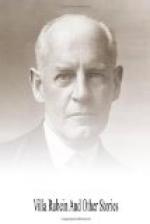The morning of arrival at the mines was grey and cheerless; a cloud of smoke, beaten down by drizzle, clung above the forest; the wooden houses straggled dismally in the unkempt semblance of a street, against a background of endless, silent woods. An air of blank discouragement brooded over everything; cranes jutted idly over empty trucks; the long jetty oozed black slime; miners with listless faces stood in the rain; dogs fought under their very legs. On the way to the hotel they met no one busy or serene except a Chinee who was polishing a dish-cover.
The late superintendent, a cowed man, regaled them at lunch with his forebodings; his attitude toward the situation was like the food, which was greasy and uninspiring. Alone together once more, the two newcomers eyed each other sadly.
“Oh dear!” sighed Pippin. “We must change all this, Scorrier; it will never do to go back beaten. I shall not go back beaten; you will have to carry me on my shield;” and slyly: “Too heavy, eh? Poor fellow!” Then for a long time he was silent, moving his lips as if adding up the cost. Suddenly he sighed, and grasping Scorrier’s arm, said: “Dull, aren’t I? What will you do? Put me in your report, ’New Superintendent—sad, dull dog—not a word to throw at a cat!’” And as if the new task were too much for him, he sank back in thought. The last words he said to Scorrier that night were: “Very silent here. It’s hard to believe one’s here for life. But I feel I am. Mustn’t be a coward, though!” and brushing his forehead, as though to clear from it a cobweb of faint thoughts, he hurried off.
Scorrier stayed on the veranda smoking. The rain had ceased, a few stars were burning dimly; even above the squalor of the township the scent of the forests, the interminable forests, brooded. There sprang into his mind the memory of a picture from one of his children’s fairy books—the picture of a little bearded man on tiptoe, with poised head and a great sword, slashing at the castle of a giant. It reminded him of Pippin. And suddenly, even to Scorrier—whose existence was one long encounter with strange places—the unseen presence of those woods, their heavy, healthy scent, the little sounds, like squeaks from tiny toys, issuing out of the gloomy silence, seemed intolerable, to be shunned, from the mere instinct of self-preservation. He thought of the evening he had spent in the bosom of “Down-by-the-starn” Hemmings’ family, receiving his last instructions—the security of that suburban villa, its discouraging gentility; the superior acidity of the Miss Hemmings; the noble names of large contractors, of company promoters, of a peer, dragged with the lightness of gun-carriages across the conversation; the autocracy of Hemmings, rasped up here and there, by some domestic contradiction. It was all so nice and safe—as if the whole thing had been fastened to an anchor sunk beneath the pink cabbages of the drawing-room carpet! Hemmings, seeing him off the premises, had said with secrecy: “Little Pippin will have a good thing. We shall make his salary L——. He’ll be a great man-quite a king. Ha-ha!”




